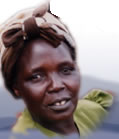THEMES IN THIS
TESTIMONY
Communications

Development

Education

Health

Spiritual Beliefs

Click on arrows
to find more
testimonies
featuring
these themes
|
|
Sex
|
Female
|
|
|
Age
|
24
|
|
|
Identity
|
Sabaot
|
|
|
Occupation
|
Teacher
|
|
|
Location
|
n/a
|
|
|
Date
|
November 1996
|
|
summary
A responsive and informative narrator who provides some interesting material in this long interview. The questions posed are pertinent and thorough and produce, among other things, the narrator’s detailed analysis of the reasons for underdevelopment in the Mount Elgon region. There are unfortunately some parts which are unclear, and the interview can take a while for the reader to get into - one of the reasons being the many one-line answers. Despite this, it is worth persevering as Lydia makes some enlightening comments on development, the increased problem of drinking among young people, attitudes towards family planning, and people’s ambivalent approach to education. It is particularly interesting to note that unlike most of the other narrators, Lydia believes living in a society dominated by one ethnic group can be a cause of underdevelopment and stagnation, and that tribal diversity can be a positive force for innovation and progress, not just a cause of conflict. Without any variety, she believes that people are ignorant of new ideas. “We are not developed because we are of the same ethnic group.”
detailed breakdown
|
You will need a password from Panos to view the full
transcript of the interview. To apply for a password, click here.
Once you have a password, click here to go to the beginning
of the transcript. You can also click on any section of the
breakdown of content below and go straight to the
corresponding part of the transcript.
|
| Section 1-4 |
Her educational history: successful despite financial problems.
|
| Section 5 |
Describes her elopement and her subsequent guilt towards her family.
|
| Section 6 |
Difficulties caused by being evaluated by poor assessors during her early career as a teacher. Problems for teachers caused by poor roads and heavy rainfall.
|
| Section 7-8 |
Girls drop out of school due to pregnancy and/or marriage; pupils drink and smoke and are undisciplined. Action taken by teachers to try and tackle these problems.
|
| Section 9-10 |
Women’s groups and their activities.
|
| Section 11 |
The narrator’s view on the causes of underdevelopment in Mount Elgon: lack of tribal diversity she believes leads to low level of competition or innovation, and she regrets the lack of influence from more “advanced” people. “You also know the consequences of sowing the same tree each planting time and if one just decides to sit in a house without visiting the neighbouring houses.”
|
| Section 12 |
“People are now beginning to understand what advancement means”.
Improvements in employment and development since Mount Elgon became a district; before people felt that they were not being represented in government.
|
| Section 13-14 |
Development and education go hand in hand.
Local youth group more active at the grassroots level than the women’s groups: they have been constructing roads and livestock breeding.
Problems with the women’s group - lack of activity, disputes over registration fee. Obtaining a loan from ActionAid to purchase maize.
|
| Section 15-17 |
Role of NGOs in Mount Elgon: provision of piped water; assisting in road construction; health education and advice on raising disabled children; child sponsorship.
Role of the government: building schools, providing employment.
Problem of job positions not being filled because of lack of educated people.
Education brings employment equality between the sexes: women have the same job opportunities as men, according to the narrator.
|
| Section 17-18 |
Reasons for migration from Mount Elgon: people seek diversity; ability to save money. Most who leave, come back eventually to the area, to buy land from savings and settle.
|
| Section 18-19 |
The role of the Church in the region - uniting people, creating employment, building schools and roads, child sponsorship.
|
| Section 19-20 |
Animosity towards the Church because it abolished traditional practices such as female circumcision and the traditional ancestor cult. “The coming of the church was seen as an agent of destroying their culture.”
|
| Section 20-21 |
Reasons for sending children to school: “...so that they can get employment and be good future leaders.” Believes that without education the community will continue to be underdeveloped. Discusses people’s high expectations of education and the educated: that they will always find employment and that they will share out their income.
|
| Section 21-22 |
Adult education in Mount Elgon.
Definition of prosperity: “One is regarded as prosperous when you have got cattle, land to plant crops on, and you have got a very nice house.”
Need to improve infrastructure in Mount Elgon; need for better transport, communication, schools, and healthcare.
|
| Section 22 |
Family planning: “Almost all mothers have heard of it but most of them despise it because they still believe in giving birth until menopause.... Everybody has heard about it, even those in the interior know about the use of pills and injections. But to them many children mean wealth....There are some that fear going [to family planning centres] because of what their friends have experienced like backaches, chest problems, giving birth to deformed children, and this has scared them off.”
Languages spoken in the region: advantages of knowing Kiswahili and English for communication, to find out about what is going on in the wider world, and for tourism.
|
| Section 23 |
Radio and its role in educating and informing about the world.
Informal education for girls via story telling by grandmother. |
|


